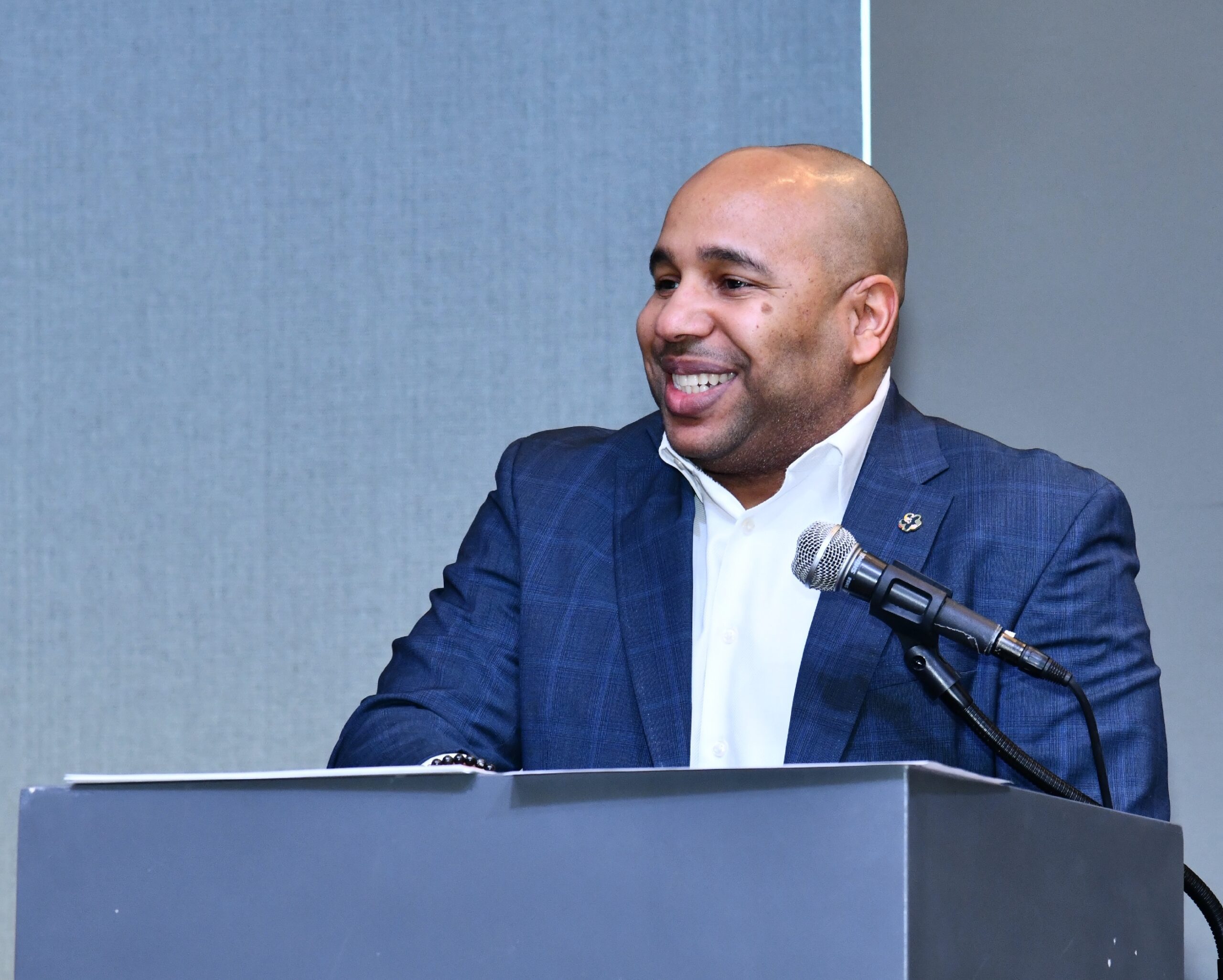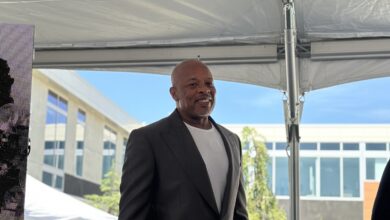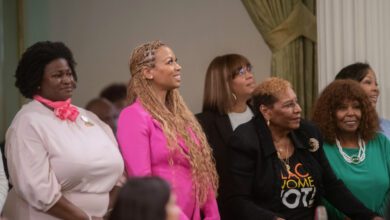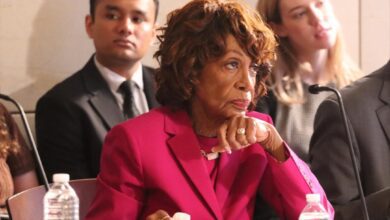-Celebrating Financial Literacy Month-
Lendistry CEO Everett Sands Pioneers with Scientific Brilliance

By Kenneth Miller, Publisher
“Bringing the gifts that my ancestors gave,
I am the dream and the hope of the slave.
I rise”—I Rise (last verse) Maya Angelou
Everett K. Sands, the Chief Executive Officer of Lendistry, began life as a small child with a brain that imagined a lot of what ifs.
What if his grandfather had the money to expand versus contract his tailor shop? What if his parents did not start college at Howard University in Washington DC when they were older?
And so, when a young Everett set off on a path to solve complicated financial puzzles that drive most people crazy, it tuned his competitive mind similar to the way a Michael Jordan or a LeBron James trained their body to become the greatest basketball players in history.
The wisdom he accumulated would lead this son of a doctor to earn a scholarship to a prestigious boarding school in Concord, NH area where he met several affluent people including two heirs of the Walmart Family, the richest family in America. The by chance meeting was enough for him to realize that he belonged.
His mother prayed for him to become a trailblazer and while he admitted that he does sometimes think about what causes him to think the way he does, he has not fully embraced pioneer status.
On zoom he sat isolated on a multicolored stripe couch, wearing a purple polo with Lendistry stitched across his heart and a white Nike check on the left sleeve, expanding on how he became arguably one of the most impactful men in finance and lending for 58 minutes.
His laser eyes adjusted the computer for better concentration and his mind races to perfect his illustration of the next question.
Where does the foundation of Everett K. Sands begin?
“I don’t think there is a single thing, like anybody else. We are all a series of events. The way I best describe it, which is probably not perfect, but is what’s in my mind: I grew up as a kid with a lot of what ifs. I have parents that went to Howard, but they went late. They went to undergrad on time and went to graduate school kind of late. But you see your parents go late and you say, ‘Oh that’s interesting’, and then we’d drive past buildings and my mom would say that was your grandfather’s shop. The question is, why isn’t it the shop now? And then you start to put the pieces together.”
He started to assemble the puzzle when he attended that boarding school and met really affluent people which also included two of the Walton granddaughters with whom he had a casual acquaintance.
They came to school in a limo, Sands did not show up in a limousine. When his friend asked if he knew who the twins were, he did not. He wasn’t poor, but certainly not as wealthy as his classmates. It didn’t take long for him to discover their grandfather is the founder of Walmart.
Sands was able to research and discovered their grandfather got a loan for roughly $30,000, but his grandfather did not gain access to capital and theirs did.
“I then started to put the pieces together. My parents went to school late because the money wasn’t there. We don’t have that building anymore because something happened with the business. Those moments and thoughts led me to ponder, what if they had the access to capital?”
Sands contemplated what if he was there and what could he have done, his competitive juices flowing.
Lendistry, which he founded in 2015, is a byproduct of Sands looking at every business as if it was his grandfather’s, and it didn’t matter whether you were Black or white.
“I am a scientist by nature. I grew up premed, my dad’s a doctor, and so in science what you learn is A/B testing. You learn how to look at a problem with multiple solutions because most scientists are trying to discover a cure for something, but I brought that into lending and that’s my product, process and policy conversation,” he elaborated.
Sands genius is a rare combination of renown scientist George Washington Carver and historical financier Maggie Lena Walker who was the first Black woman to establish and serve as president of a bank in the United States in 1903.
“I am a scientist, and I am an individual who is extremely competitive, and when you push both of those together and you have me focus on underserved and undercapitalized communities, that’s what you get. You get this guy that’s extremely determined to figure it out,” he said.
From the boarding school, Sands went on to the University of Pennsylvania where he currently serves as a board member for the Penn Institute for Urban Research and the Center for Strategic Economic Studies and Institutional Development.
While at Penn he met a mentor who tasked him to create a mortgage company. He was the person who did all of the research and did all of the things to figure it out. Although he and his mentor went their separate ways, Sands joined forces with a fraternity brother and the two of them developed one of the top 10 mortgage companies in the Mid-Atlantic. Eventually, they earned a board seat on the first of the Black bank in Maryland, Ideal Federal Savings.
That was at just 26 -years of age and the two frat brothers have remained business partners since 1999.
The Ideal Federal Savings experience sparked something in him. He understood financing and subsequently sold the mortgage company and went to another Black bank as a leader.
“Those two experiences of sitting on the board of the bank are real life experiences that teach you things you don’t learn at Penn.”
By the time he went to Wells Fargo he was like an outlier because he could do almost everything.
“I ended up becoming the top one percent at Wells in terms of revenue, LMI lending and Minority Lending. At the end of the day the stat from profitability matters most to all of the other stuff.”
Although he was in the top one percent, he also embraced being a token. Nonetheless he managed to obtain levels of knowledge at Wells that he could not at the community bank.
The light bulb went on when he was introduced to corresponding banking which is the group that lends money to community banks.
He defined National Financial Literacy Month by merely prescribing solutions to the community it plagues.
“I think it means a couple of things. How do we think about deploying education and resources out to those who are looking to either expand their future, somewhat get a hold of their future and/or lay the foundation,” he stated eloquently.
Sands is motivated to do more than just get the word out, “One of the things that’s been part of my career is thinking about access to capital for underserved communities. I think about it in three different ways. I think about it as product, a process and a policy question, and those are the three things that I am typically working on.”
When he thinks about financial literacy as a whole, process is the one that comes up.
“We’ve all said, hey… I wish would have learned more about credit in high school or how to balance my check book when I was a kid. I think where we have a challenge is we don’t always meet the user where they are at. The average kid is spending about two hours on TikToc right now, so are we creating a financial literacy that’s on TikTok? Or, are we saying hey you should read this book? I am not saying there is anything wrong with reading, I am a reader, but I am also saying you have to have multiple ways to reach an audience, and you have find ways to reach an audience where they are at.”
Sands admits that there are some structural issues, particularly legislatively, that seem to be stacked against Blacks and minorities.
“I think the first thing we need to look at is, have there been a higher number of Black politicians, and I think the answer to that question is yes. Are we, people on the ground helping them execute. At a high level it’s about voting, but on a secondary level it’s about having conversations no different than if you were going to address your neighborhood,” Sands added.
He educates politicians when he meets with them and asks what the goal is from a legislative standpoint, and then he shares with them what’s happening from the street to bring about a resolution that benefits both the public servant and the community they serve.
Sands believes the reason that Black communities suffer is because we are behind in the steps, “That doesn’t mean you don’t go through the evolution of the steps, that means you’re behind in the race, those are two separate things.”
The first step was to get our voices heard, then to elect officials who served our best interest and now, the responsibility of this generation is execution, which is what Lendistry did during the COVID pandemic.
“When it came time for the pandemic, we raised our hand and said let us be in the ball game of programming so that we could be the deployers of capital.”
That wasn’t easy because Lendistry had to assemble themselves very quickly and do all of the things the government required.
Lendistry became a one of the top producers for the SBA’s Paycheck Protection Program during the pandemic, granting loans up to $10 million nationwide, and then because of determination and client focus, Lendistry deployed upwards of $8 billion to more than half a million businesses across all 50 states.
Additionally, he was instrumental in the State of California non-profits receiving funding, the only state to do so.
Family is super important for Sands, most of them are here in Southern California but his mother is still in D.C.
“I work hard for them so that they don’t have to work as hard as I have to work,” he concluded.
Sands is very sensitive and protective of his family, especially his twin daughters.
“Like any parent, I feel most helpless when they are sick or not feeling well.”
At his core, he is a revolutionary teacher who has the uncanny ability to elucidate complicated financial widgets so the everyday consumer can comprehend.
Lendistry has mega partners like Amazon on its roster in addition to the myriad of banks and other financial institutions that rely on their services.
Everett K. Sands is a renaissance man, a revolutionary responsible for billions of dollars, also lives and futures of people like his grandfather.
Paving the way for perhaps another like-minded genius to evolve.




